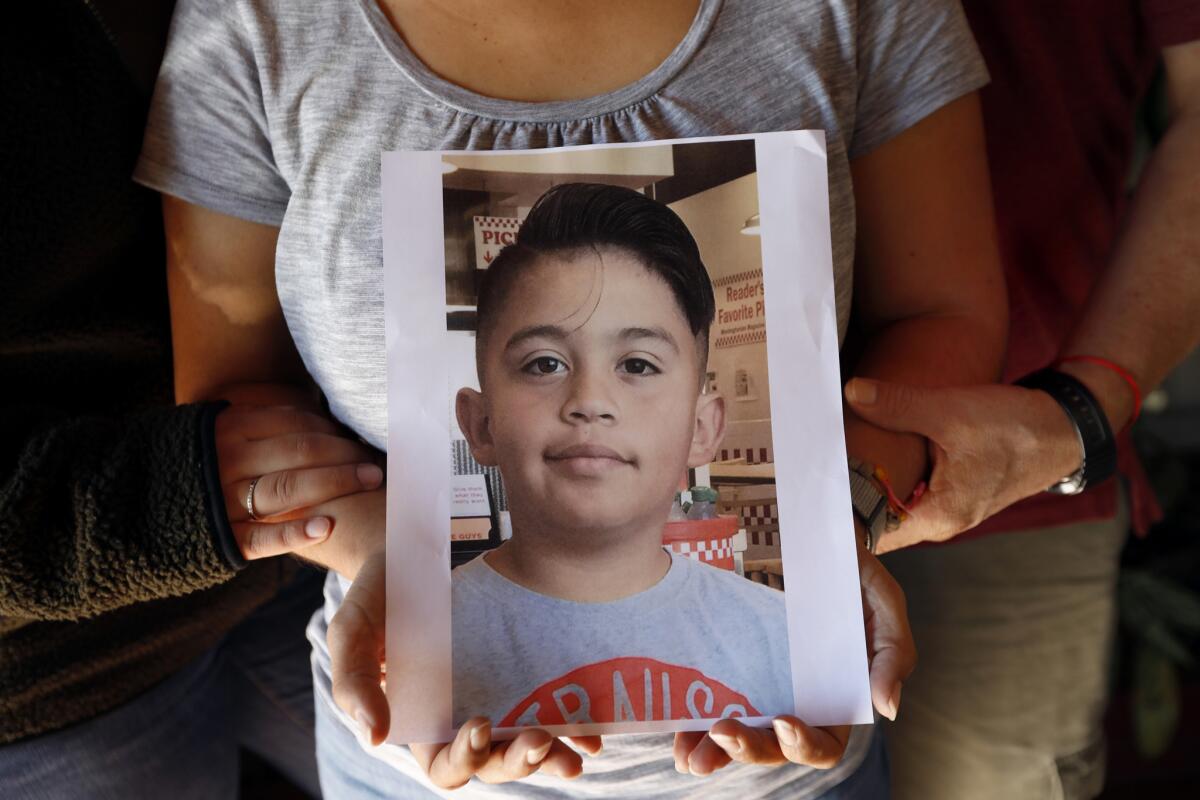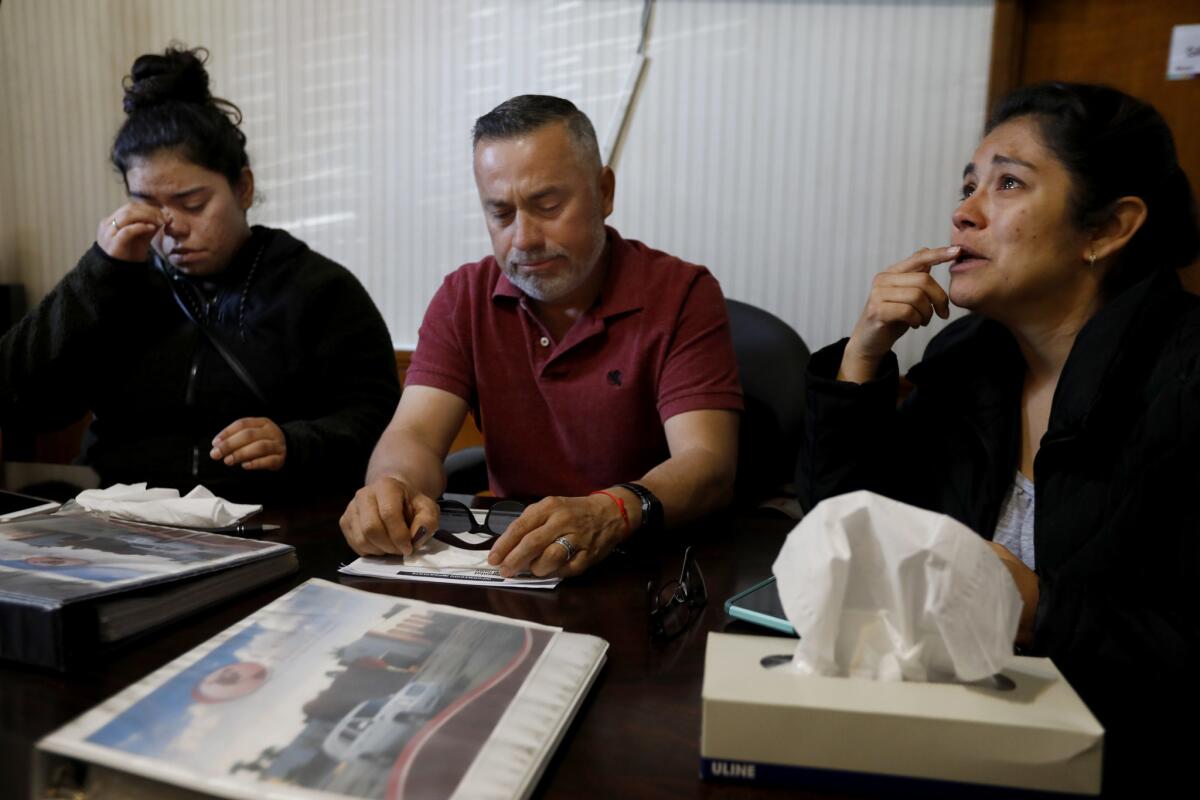Column: Their son died of cancer at 10 after brave fight. The ordeal left his parents broke, but strengthened by his memory

- Share via
The sky was tombstone gray last week when 200 people gathered to honor the lives of 1,457 people they did not know. It was L.A. County’s annual ceremony marking the burial of unclaimed remains, and this year, a few dozen of the deceased were children.
County records offered only minimal information about the deceased. Most of the children died the day they were born, others were several months old. Brian Elias, chief of operations for the L.A. County Medical Examiner-Coroner’s department, told me some of the children were abandoned or born to transients who can’t be tracked down. In other cases, there’s a back and forth as parents try to raise funds for burial, and the county keeps remains for three years before going ahead with burials.
“I’ve dealt with families that have had difficulty with the combination of grief over losing a child and not having the resources for services,” said Elias.
When I left the ceremony, I called Magda Maldonado, director of Continental Funeral Home in East Los Angeles. She told me last year that roughly half her clients have trouble paying mortuary and cemetery costs, and many of them find that it’s cheaper to fly bodies to Mexico for burial. Maldonado called me back on Thursday and said a family from La Puente had just lost a 10-year-old son and was planning a fundraiser to bury him.
Hector and Maria Torres and their daughter Jocelyn, 21, were remarkably composed when I met them at Continental on Friday morning, just 24 hours after the death of Matthew Isiah Torres. But that would not last.
The family had lived a relatively comfortable life, even if Maria’s income as a hotel clerk and Hector’s job driving trucks for a disposal company barely covered the bills. Everything changed in October of 2016.
“I went to school to pick up Matthew, and he was limping when he came out,” said Maria, who figured her extremely active child had fallen or bumped into something.
Matthew said he didn’t know what was wrong and insisted he was fine. But the pain in his right knee didn’t go away, so Maria took him back to the doctor for X-rays that showed an abnormality. After a biopsy a week later, Matthew, 8 at the time, found out he had bone cancer.
“On my 40th birthday, he started chemotherapy and he fought very hard,” said Maria, unable to hold back tears.
A knee replacement was one option, but that would involve multiple surgeries and the disease might persist.
“Even as a baby, he was so independent and so strong,” Jocelyn said of her little brother as her father fought tears.

The family asked Matthew what he wanted to do. He chose amputation.
“As a mom, I wanted to see my baby whole,” said Maria. “I wanted to see him the way he was born, with two legs and a full life.”
Matthew said he didn’t want to have to keep going back to the hospital and he stuck with his decision.
“We are so blessed to be the parents of a very unique individual,” said Maria.
When she and her husband were working, before Matthew got sick, Jocelyn looked after her little brother.
“I was like his second mom, and ever since he was a baby he wanted to sleep in my bed,” said Jocelyn. “Mom and Dad would work long hours and come home at 7, 8, 9 at night. I would get out of school and find my way to him, and he was my best friend.”
Five days after his amputation in early February of 2017, Matthew, whose sport was jujitsu, had to find new ways to stay busy. His mother bought him a remote control truck and his friend Junior from across the street would come play with him.
A week after the amputation, a scan turned up cancer in Matthew’s lungs. On his 9th birthday in July of 2017, he was in the hospital, completing chemotherapy treatment and celebrating with red velvet cake.
In the weeks that followed, the family’s hopes rose. Matthew was recovering nicely and the cancer appeared to be in retreat. But three months later, it was back in his lungs. Matthew said he was not going to let the next round of chemo take his hair, so he took a pair of electric shears and shaved it off himself. This was not easy for him. He had thick dark hair and he took care to make sure to maintain it just so. On a video of the clip job, his nervous laugh can be heard.
“He would not submit to cancer,” said Maria. Always, he would take control.
Matthew taught himself to swim and learned how to ride a bike with one leg. His buddy Junior kept coming to play with him, and the boys didn’t let Matthew’s illness get in the way of their fun.
“He was optimistic the entire time. He never had a why-me phase and he never complained about anything,” said Jocelyn.
“He would always smile and laugh and make other people laugh, and he never felt sorry for himself,” said Maria.
“As difficult as this last year was for him, you would never be able to tell he was going through this torture,” Jocelyn said, convulsing in tears.
Maria quit work to care for Matthew full time and make doctor and hospital visits, and Jocelyn got a job at In’N’Out to help pay bills. Hector Torres kept working until two months ago, when he tore a knee ligament at work and went on disability. Hector’s Kaiser plan covered the bulk of Matthew’s medical bills, but the family’s savings dwindled to nothing.
Every time Matthew got a scan, the cancer had spread. Lungs, hips, his other knee, his ankle. In September, it went to his brain and a tumor was surgically removed.
The family decided not to subject him to any more tests or hospital visits, and Matthew didn’t ask why. In the last week, he called Junior to come play with him and the family heard the boys laughing in Matthew’s room. He called Maria’s godson over to watch a video with him and then they took a nap together.
It was grace and courage all the way the through. The brave little boy was quiet on Wednesday, and on Thursday morning, at 11:15, the suffering was over.
On Friday, while the family filled out paperwork at the mortuary, Magda Maldonado took me into her office and showed me a wall-board with the names of all the recent deceased. The list included 33 people who had been unclaimed by relatives, friends or anyone else this years. Hospice agencies had asked Continental to handle the bodies, and Maldonado said they were cremated and will be laid to rest in one of the upcoming annual county burials in Boyle Heights. She said 33 was the highest number ever for her mortuary in a single year.
In California, wealth and poverty coexist like nowhere else in the nation, and for far too many people, death brings yet another bill too big too handle. Maldonado said fundraisers are common among those who come through her door. They are determined not to let their loved ones pass — the old and young alike — without the dignity of proper burials.
The Torres family picked out and will pay for a $1,550 casket for Matthew. Hector Torres is the cousin of a man married to one of the Maldonados, and Continental will cover the mortuary costs. But the family was on the way to the cemetery Friday to make arrangements that may cost as much as $10,000, and the family is planning a food fest and silent auction to help cover the costs.
Jocelyn left college to help care for her little brother. She said that in the hospital, she was moved by how compassionate and helpful Matthew’s nurses were, and she intends to become a pediatric oncology nurse. She left no doubt that she will be a good one.
Hector and Maria seemed to find some strength in talking about Matthew’s embrace of life and his courage in facing death. They fought tears, but they smiled a lot too and held each other’s hands.
In a week in which 1,457 poor souls were buried alone, but for the strangers who paid their respects, Matthew Isiah Torres was at least surrounded by family in his final hours.
He was known; he was loved; he will be remembered.
Get more of Steve Lopez's work and follow him on Twitter @LATstevelopez
Sign up for Essential California
The most important California stories and recommendations in your inbox every morning.
You may occasionally receive promotional content from the Los Angeles Times.








